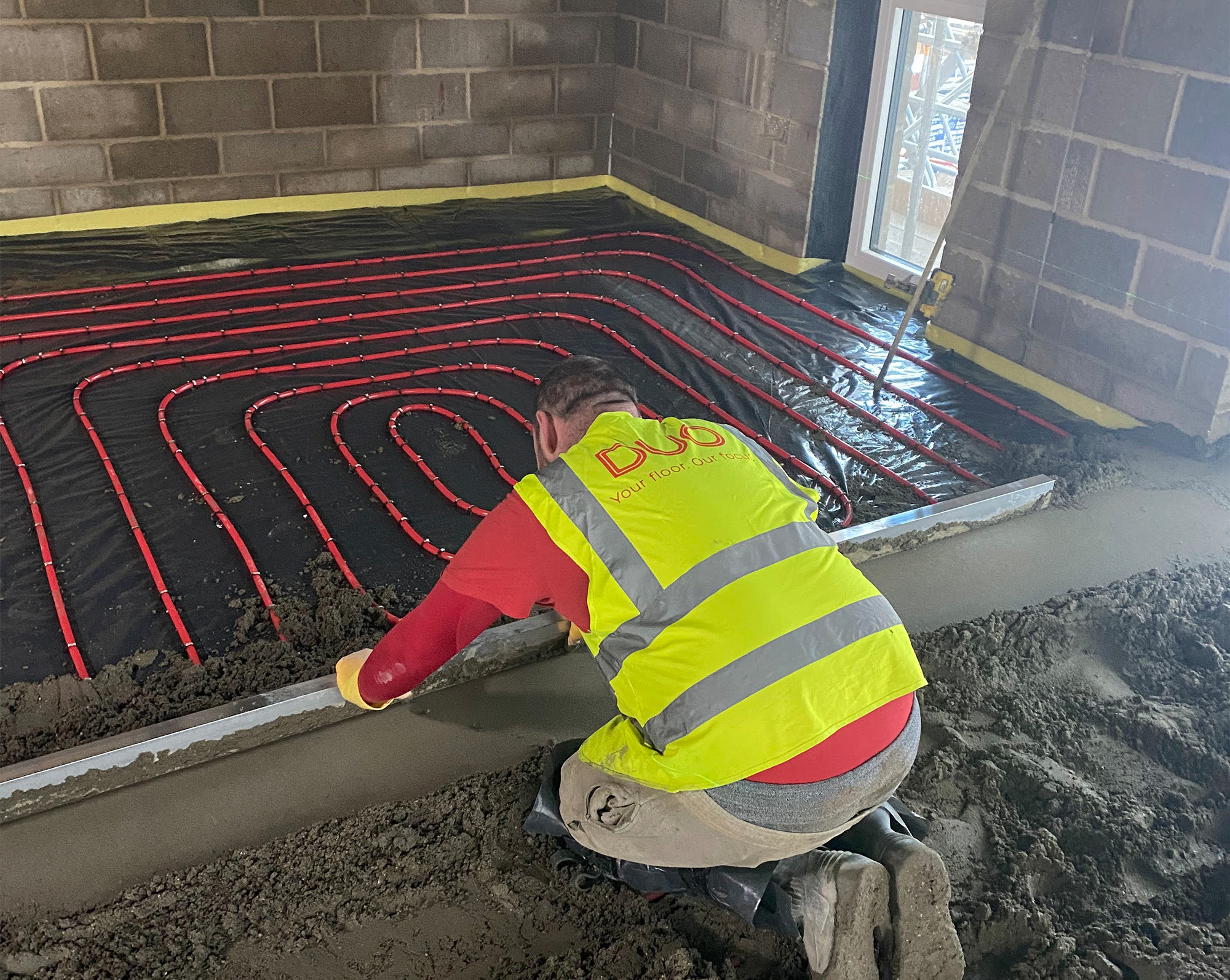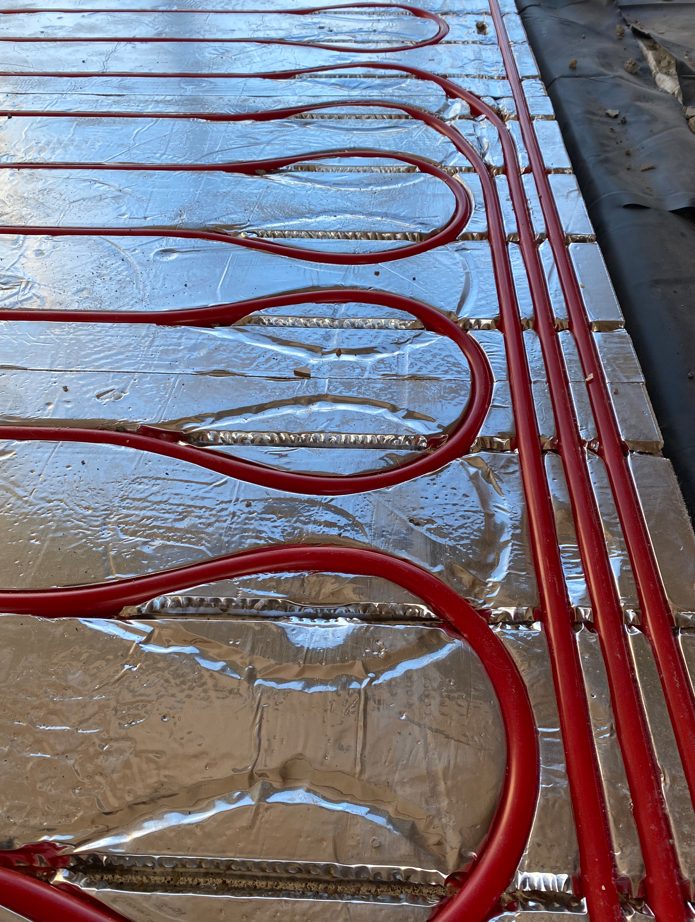When considering underfloor heating for your home, it’s important to understand the factors that can influence the installation cost. The underfloor heating installation cost in Kent can vary depending on several key elements, such as the type of system you choose, the size of the space being heated, and the complexity of the project. Homeowners often face different pricing based on whether they opt for an electric or water-based system. By familiarising yourself with these factors, you’ll be better prepared to budget for your project and make informed decisions that suit your home and financial goals. This guide will explore 10 critical factors that impact underfloor heating installation costs, helping you plan wisely for your next home improvement project.
The factors are as follows :
1. Type Of Underfloor Heating System
The type of underfloor heating system you select is a major factor that influences the underfloor heating installation cost in Kent. There are two main types: electric (dry) and water-based (wet) systems. Electric underfloor heating systems are usually cheaper to install, as they involve less labour and materials. However, they tend to be more expensive to operate due to higher electricity costs. Water-based systems, while more costly to install, are much more energy-efficient and can significantly lower your energy bills over time. This type is particularly suitable for larger homes and spaces, as they are powered by the home’s central heating system.
Choosing between these two systems will depend on your budget, the area size, and long-term energy-saving goals. Water-based systems often provide a better return on investment due to their lower running costs, but electric systems can be more convenient for smaller spaces or specific areas in a home. Understanding these differences is crucial when planning your underfloor heating installation in Kent.
2. Size Of The Area
The size of the area you want to heat plays a significant role in determining the overall cost of underfloor heating installation. Larger areas will naturally require more materials, such as heating pipes or electric cables, and additional labour to complete the job, driving up the cost. Heating a small room, like a bathroom, will cost significantly less than heating an entire floor or multiple rooms in your home.
Additionally, larger spaces may be more cost-effective when paired with a water-based system, which operates more efficiently over bigger areas. Meanwhile, smaller spaces might benefit from the easier installation of electric systems, though their running costs can be higher. The layout of the space also matters, as irregularly shaped rooms or those with many obstacles may increase installation complexity, which in turn impacts the cost. When planning your underfloor heating in Kent, it’s essential to consider how the size of the area will affect your budget.
3. Type Of Flooring
The type of flooring in your home is another important factor that influences the underfloor heating installation cost in Kent. Certain flooring materials, like tile and stone, are excellent conductors of heat and work efficiently with underfloor heating systems. These materials often do not require additional preparation, making them more cost-effective to work with. However, if your home has wooden, laminate, or carpet flooring, special underlayments or insulation may be needed to ensure the heat is properly distributed without damaging the floor, which can increase installation costs.
Wooden floors, for example, can expand and contract with heat, so choosing the right type of wood and underfloor heating system is essential. Carpeted floors may also require careful planning, as thick carpets can act as insulators and reduce the system’s efficiency. The more compatible the flooring is with underfloor heating, the lower the preparation costs, making flooring type an essential consideration for your budget.
4. Existing Heating System Compatibility
The compatibility of your current heating system with underfloor heating is another factor that can influence the installation cost. If your home has a modern, energy-efficient boiler, particularly for water-based systems, the installation process will be simpler and potentially less expensive. However, older heating systems may require upgrades or modifications to ensure compatibility with underfloor heating, especially for water-based systems that need a strong connection to the existing boiler.
For electric systems, there’s less dependency on the current setup, but there may still be some electrical considerations that could add to the cost. Additionally, integrating underfloor heating with your existing heating system, whether it’s electric or water-based, may require extra equipment like thermostats or controls to ensure both systems work together seamlessly. Any necessary upgrades or adjustments to your current system can increase the total installation cost, so it’s important to factor this in when planning your project.
5. Labour Costs
Labour costs are a key factor influencing underfloor heating installation costs. In Kent, the price of hiring professionals can vary depending on the complexity of the project and the size of the area being heated. Smaller projects, like a single room, might take a day to complete, while larger installations could take several days, increasing the labour cost.
The skill level of the installation team also affects pricing. Hiring experienced and certified professionals may cost more upfront, but it ensures the job is done correctly, reducing the risk of future repairs or inefficiencies. It’s important to remember that a well-installed system will last longer and perform better, making professional labour a worthwhile investment.

6. Insulation Requirements
Proper insulation is crucial for underfloor heating to function efficiently, and it can influence the overall installation cost. Without adequate insulation, much of the heat generated by the system can be lost to the ground, which reduces efficiency and increases energy bills. If your home lacks sufficient insulation beneath the floors, you may need to install extra insulating layers before fitting the underfloor heating system, which will increase costs.
Good insulation ensures that the heat is directed upwards into the room, improving the system’s performance. While this additional step can raise the installation price, it’s a vital investment to maximise energy efficiency and long-term cost savings. Ensuring proper insulation will help your underfloor heating work effectively, keeping your home warmer without unnecessary heat loss.
7. Thermostat And Zoning Options
The choice of thermostat and zoning options can impact the overall underfloor heating installation cost in Kent. Basic thermostats are more affordable, but advanced options, such as smart thermostats, provide better control and energy savings. Smart thermostats allow you to program heating schedules and adjust temperatures remotely, improving efficiency, though they come with a higher upfront cost.
Zoning systems enable you to control the heating in different areas of your home independently. This means you can heat certain rooms only when needed, leading to long-term energy savings. However, adding zoning increases the installation complexity and cost.
8. Floor Preparation
The condition of your existing floor can significantly impact the cost of underfloor heating installation. Before the system is installed, the floor must be properly prepared to ensure the heating system operates efficiently. In some cases, your current flooring may need levelling or reinforcing, which will increase the installation cost.
If the floor is uneven, additional materials and labour are required to create a smooth surface for the underfloor heating system. Floors in poor condition might also need repairing or replacing, further adding to the cost. Furthermore, certain types of flooring may require the addition of a vapour barrier or extra layers of insulation to prevent heat loss. Proper floor preparation is essential for ensuring your heating system works efficiently, as an uneven or unprepared surface could result in uneven heating or system malfunctions over time.
The more preparation needed for your floor, the higher the installation costs will be, so it’s important to factor this into your budget when planning for underfloor heating.
9. Building Regulations And Permissions
In some cases, the installation of underfloor heating may require you to comply with building regulations, which can influence the overall cost. Depending on the type of system, particularly water-based underfloor heating, and the extent of the installation, there may be specific rules or permissions needed, especially if you’re working on a new build or a large renovation in Kent.
For instance, water-based systems connected to your boiler may require additional inspection to ensure they meet local standards. Failure to comply with these regulations could lead to fines or the need for re-installation. The cost of acquiring these permissions or hiring professionals to ensure compliance will add to the overall installation cost.
It’s important to check with local authorities or consult your installer to determine if your project requires any special permissions. While this might increase upfront costs, it ensures the system is installed correctly and legally, providing peace of mind for homeowners.

10. Long-Term Energy Savings
While the initial installation cost of underfloor heating might seem high, it’s important to consider the long-term energy savings this system can offer. Underfloor heating operates at lower temperatures than traditional radiators while still providing a consistent and comfortable level of warmth. This means that it uses less energy, leading to lower utility bills over time.
Water-based systems are particularly efficient in larger spaces, and when paired with renewable energy sources like heat pumps, they can further reduce energy consumption. Even electric systems, when used in well-insulated homes, offer significant savings compared to conventional heating systems. These long-term savings can offset the initial installation cost, making underfloor heating a wise investment for energy-conscious homeowners.
Additionally, modern systems often come with advanced controls like smart thermostats and zoning options, which allow you to customise your heating to specific rooms, reducing unnecessary energy use. This level of efficiency contributes to further savings on your energy bills year after year, making underfloor heating an excellent long-term choice for homes in Kent.
Save Money On Expert Underfloor Heating Installation Cost In Kent
Installing underfloor heating in your Kent home is a smart investment that can bring long-term savings on energy bills and enhance overall comfort. By understanding the factors that influence the underfloor heating installation cost, you can make informed decisions to suit your budget and home needs. From the type of system to insulation and labour, every detail matters in ensuring efficiency and durability.
At Duo Systems, we provide expert underfloor heating installation services, ensuring your system is installed professionally and optimally. Contact us today on 02380675888 to get started and see how we can help you save on energy bills while keeping your home warm and comfortable.


